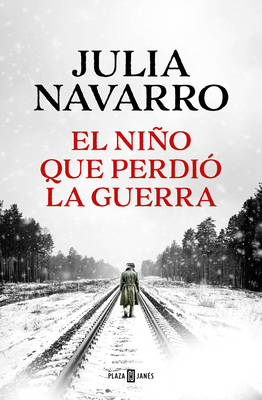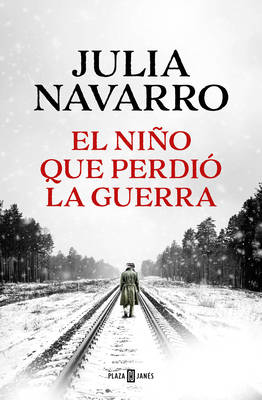
Wil je zeker zijn dat je cadeautjes op tijd onder de kerstboom liggen? Onze winkels ontvangen jou met open armen. Nu met extra openingsuren op zondag!
- Afhalen na 1 uur in een winkel met voorraad
- Gratis thuislevering in België vanaf € 30
- Ruim aanbod met 7 miljoen producten
Wil je zeker zijn dat je cadeautjes op tijd onder de kerstboom liggen? Onze winkels ontvangen jou met open armen. Nu met extra openingsuren op zondag!
- Afhalen na 1 uur in een winkel met voorraad
- Gratis thuislevering in België vanaf € 30
- Ruim aanbod met 7 miljoen producten
Zoeken
€ 34,95
+ 69 punten
Omschrijving
Un niño. Dos países. Dos ideologías. Una emocionante y ambiciosa novela sobre la identidad y el poder arrollador de la cultura que nos muestra que, incluso en los rincones más oscuros de la Historia, la vida se abre paso. Madrid, invierno de 1938 Clotilde, una artista gráfica que dibuja caricaturas para los diarios republicanos, asiste en Madrid a los últimos meses de la Guerra Civil. La caída de la República es inminente, por lo que su marido, militante comunista que trabaja para los rusos, decide enviar a Moscú a su hijo Pablo, de tan solo cinco años, en contra de su voluntad. Clotilde se resiste con todas sus fuerzas, pero no logra evitar que el comandante Borís Petrov emprenda ese arriesgado viaje por una España en llamas para cumplir con el deseo de su camarada de llevar a Pablo a la Unión Soviética, donde Stalin está levantando un nuevo país sobre las ruinas del antiguo régimen. Moscú, primavera de 1939 Allí es recibido por su nueva familia que, conmovida por su trágico exilio, acoge con afecto a un niño exhausto y enfermo. Anya no duda en cuidar de Pablo como si fuese su propio hijo, sin hacer distinciones con Igor, su hermano de adopción. Hija y esposa de dos orgullosos héroes de la Revolución -su padre luchó junto a Lenin, su marido a las órdenes de Stalin-, Anya ama la poesía y la música, aficiones sospechosas y burguesas a los ojos del poder. Mientras sus ilusiones naufragan en el ambiente cada vez más opresivo del terror estalinista, su espíritu se rebela contra la injusticia, la miseria, la ausencia de libertad y el Gulag. Pablo crece entre el recuerdo cada vez más tenue de su madre, que no ceja en su empeño por recuperarlo, y el cariño de Anya, quien le transmite su amor por la música, la literatura y sus deseos de libertad. Dos mujeres unidas por el destino de un niño y enfrentadas al mismo espejo: el de las ideologías totalitarias a las que sucumbió el siglo XX. Se puede perder una guerra, pero se puede ganar la libertad ENGLISH DESCRIPTION One boy. Two nations. Two ideologies.
A thrilling and ambitious novel about identity and the overwhelming power of culture that shows us how, even at the darkest corners of history, life finds a way.
Madrid, Winter of 1938 Clotilde, a graphic artist that draws cartoons for republican newspapers, spends the last months of the Civil War in Madrid. The fall of the Republic is imminent, so her husband, a communist militant working for the Russians, must send their son, Pablo, only five years old, to Moscow against her will. Clotilde resists with all her might, but can't stop commander Boris Petrov from embarking on this dangerous journey through a Spain in flames to fulfil his comrade's wish and deliver Pablo to the Soviet Union, where Stalin is erecting a new country on top of the ruins of the old regime. Moscow, Spring of 1939
There he is greeted by his new family. Touched by his tragic exile, they affectionally welcome an exhausted and sick boy. Anya immediately takes care of Pablo as if he were her own son, making no distinction between him and Igor, Pablo's adoptive brother. Daughter and wife of two proud heroes of the Revolution--her father fought next to Lenin, her husband under Stalin--Anya loves poetry and music, dubious and bourgeois interests in the eyes of the authorities. While her illusions capsize within the increasingly oppressive Stalinist terror, her spirit rebels against injustice, misery, the absence of freedom, and the Gulag. Pablo grows up between the ever-more tenuous memory of his mother, relentless in her efforts to get him back, and Anya's love, who shares with him her love for music, for literature, and her yearning for freedom. Two women united by a boy's fate, both reflected in the same mirror: the totalitarian ideologies the twentieth century succumbed to. You may lose a war, and yet earn your freedom.
A thrilling and ambitious novel about identity and the overwhelming power of culture that shows us how, even at the darkest corners of history, life finds a way.
Madrid, Winter of 1938 Clotilde, a graphic artist that draws cartoons for republican newspapers, spends the last months of the Civil War in Madrid. The fall of the Republic is imminent, so her husband, a communist militant working for the Russians, must send their son, Pablo, only five years old, to Moscow against her will. Clotilde resists with all her might, but can't stop commander Boris Petrov from embarking on this dangerous journey through a Spain in flames to fulfil his comrade's wish and deliver Pablo to the Soviet Union, where Stalin is erecting a new country on top of the ruins of the old regime. Moscow, Spring of 1939
There he is greeted by his new family. Touched by his tragic exile, they affectionally welcome an exhausted and sick boy. Anya immediately takes care of Pablo as if he were her own son, making no distinction between him and Igor, Pablo's adoptive brother. Daughter and wife of two proud heroes of the Revolution--her father fought next to Lenin, her husband under Stalin--Anya loves poetry and music, dubious and bourgeois interests in the eyes of the authorities. While her illusions capsize within the increasingly oppressive Stalinist terror, her spirit rebels against injustice, misery, the absence of freedom, and the Gulag. Pablo grows up between the ever-more tenuous memory of his mother, relentless in her efforts to get him back, and Anya's love, who shares with him her love for music, for literature, and her yearning for freedom. Two women united by a boy's fate, both reflected in the same mirror: the totalitarian ideologies the twentieth century succumbed to. You may lose a war, and yet earn your freedom.
Specificaties
Betrokkenen
- Auteur(s):
- Uitgeverij:
Inhoud
- Aantal bladzijden:
- 640
- Taal:
- Spaans
Eigenschappen
- Productcode (EAN):
- 9798890982384
- Verschijningsdatum:
- 17/09/2024
- Uitvoering:
- Paperback
- Formaat:
- Trade paperback (VS)
- Afmetingen:
- 150 mm x 229 mm
- Gewicht:
- 612 g

Alleen bij Standaard Boekhandel
+ 69 punten op je klantenkaart van Standaard Boekhandel
Beoordelingen
We publiceren alleen reviews die voldoen aan de voorwaarden voor reviews. Bekijk onze voorwaarden voor reviews.











